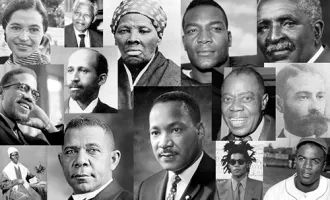This Date in UCSF History: Honoring Black History Month
Originally published in February, 2010.
Editor's note: To honor February as Black History Month, Synapse offers "snapshots" of significant dates in African-American history.
August 1619: the first Africans arrive in Virginia.
The first known Africans to arrive in the future United States were “20 and odd” men and women who arrived at Jamestown, Virginia in 1619.
They were brought there by English pirates, who had seized the Africans from a Portuguese slave ship bound for Brazil.
The slave ship was seized off the coast of Mexico by two English pirate ships, the Treasurer and the White Lion.
The pirates took some of the slaves and fled — both ships would arrive in the English colony of Jamestown within a few days of each other in the summer of 1619. The Africans were originally from the kingdoms of Ndongo and Kongo, which comprise modern-day Angola.
Both kingdoms were conquered by the Portuguese in the 1500s. The Kingdom of Ndongo had officially converted to Christianity in 1490, so it is likely that the Africans who landed in Virginia were Christians.
The English pirates traded the Africans as slaves for provisions from the white Virginians.
Thus, these Africans were the first in the long line of African slaves in the United States. We do know that not all these Africans were enslaved for life — at least some of them were freed after a number of years as indentured servants.
Millions more Africans would be transported across the Atlantic as slaves, until Britain banned the slave trade in 1834.
Some 30 years later, it would take the Civil War, the bloodiest conflict in American history, to end black slavery in the United States.
July 18,1863: The 54th Massachusetts assaults Fort Wagner
In the months after the issuing of the Emancipation Proclamation, the Lincoln administration decided to allow African Americans to enlist in the Union army.
Despite many restrictions (blacks were not allowed to be officers, and the pay scale — at first — was lower for black soldiers than whites), thousands of African Americans flocked to the colors.
Eventually, 180,000 would serve in the Union armies. Most of them were regulated to labor details, as widespread racial prejudice denied that blacks could be good soldiers.
The 54th Massachusetts, a regiment made up of free blacks living in the north (including the son of African American leader Frederick Douglass), helped to change that perception.
The regiment was included in the attack on Fort Wagner, which guarded the approach to Charleston, South Carolina.
They were picked to spearhead an ill-advised frontal assault that the Union high command deemed the only way to reduce Wagner.
While the attack was a disaster, the courage displayed by the African American troops was widely praised — the regiment suffered a casualty rate approaching 50%.
Sergeant William Carney, who carried the American flag in the assault, was awarded the Medal of Honor.
African American soldiers would take part in the fighting in the remainder of the Civil War, despite risking greater dangers than white troops: if captured by Confederates, they were often killed or returned to slavery.
Southern resistance was always noticeably fiercer when confronted by black troops.
Still, the vital role played by these African American soldiers in bringing victory to the Union cause did not go unnoticed, least of all by President Lincoln: “And then there will be some black men who can remember that, with silent tongue, and clenched teeth, and steady eye, and well-poised bayonet, they have helped mankind on to this great consummation.”
A monument to the 54th Massachusetts by the sculptor Augustus Saint Gaudens, one of the great public works of art in America, stands on the edge of Boston Common to this day.
The 1989 movie Glory is loosely based on the regiment’s exploits.
June 22, 1938: Joe Louis defeats Max Schmeling
The 1930s were a bleak period for most African Americans. The collapsed American economy hurt those at the bottom the most, and most blacks were at the lowest rung on the economic ladder.
The ‘30s were a tough time for black political leadership, as well. Jim Crow remained entrenched, and blacks lacked the power to overturn segregation.
But there was one black man whose fame and accomplishments were undisputed in the ‘30s: boxer Joe Louis.
As the Brown Bomber chalked up victory after victory in the ring, he carried a whole race along with him.
“When he won, you won,” remembered activist Dick Gregory.
But in 1936, Louis absorbed a shocking defeat at the hands of German boxer Max Schmeling.
Schmeling, a former champion, had noticed that Louis dropped his left hand after throwing his jab. Schmeling sent crushing rights into Louis’ face every time Joe dropped his left hand, knocking the American fighter out in the 12th round.
For this victory, Schmeling was lionized by Adolph Hitler, even though Schmeling was not a Nazi. But Black America was devastated by the defeat.
The African American poet Langston Hughes recalled, “I walked down Seventh Avenue and saw grown men weeping like children, and women sitting in the curbs with their head in their hands. All across the country that night when the news came that Joe was knocked out, people cried.”
Louis became heavyweight champion in 1937, defeating James J. Braddock. But the Brown Bomber had a score to settle with Schmeling. Because of world tension, the event became much more than a boxing match.
Hitler had taken over Austria in the spring of the 1938 and was casting covetous eyes at Czechoslovakia.
As war tension grew, the two fighters came to embody their respective sides, despite Schmeling’s attempts to distance himself from the Nazis: “I am a fighter, not a politician. I am no superman in any way.”
Louis was embraced by most Americans as a hero, the first time an African American had been so embraced by White America.
Louis visited the White House prior to the bout, and President Roosevelt told him, “Joe, we need muscles like yours to beat the Germans.”
The pre-fight buildup was intense and it was the most listened-to event in radio history, with millions tuning in around the world. As for the fight, it was anticlimactic.
Louis, determined to avenge his only defeat, pounced on Schmeling from the opening bell and pummeled him unmercifully.
The German was quickly helpless from the beating, and the referee stopped the bout after only two minutes and four seconds.
The victory set off memorable celebrations in black neighborhoods all over America. Joe Louis had come through.
November 4, 2008: Barack Obama is elected president
One of the most memorable moments in African-American history occurred in Chicago’s Grant Park on the night of the 2008 presidential election.
Barack Obama had been elected as the nation’s first black president, and a joyous, multiracial throng greeted the Pres-ident-elect and his family at a triumphant rally. As thousands cheered, Obama began his remarks with a powerful affirmation of the strength of American democracy:
“If there is anyone out there who still doubts that America is a place where all things are possible, who still wonders if the dream of our founders is alive in our time, who still questions the power of our democracy, tonight is your answer.”
Obama was following in the footsteps of other African Americans who had tried for the presidency.
Congresswoman Shirley Chisholm ran a mostly symbolic campaign in 1968, and Jesse Jackson scored some successes (once winning the Michigan primary) during his runs for the White House in the 1980s.
But no one had ever come close to the office before Obama.
However, Obama’s victory was no fluke. He won the Democratic Party nomination over Senator Hillary Clinton, who most political pundits had expected to cruise to the nomination.
And in the general election, Obama decisively defeated John McCain, winning the largest percentage of the vote any Democrat had won since Lyndon Johnson’s 1964 landslide.
Obama’s idealism was on full display that night in Chicago’s Grant Park: “The road ahead will be long, our climb will be steep. We may not get there in one year, or even in one term — but America, I have never been more hopeful than I am tonight that we will get there.”
Ironically, in light of the savage opposition President Obama has faced from the Republican Party, he also said that night in Chicago: “In this country, we rise or fall as one nation, as one people. Let’s resist the temptation to fall back on the same partisanship and pettiness and immaturity that has poisoned our politics for so long.”



